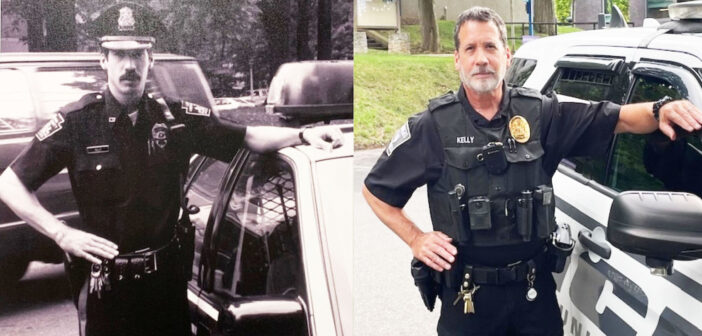LUPD Lt. Brian Kelly has worked through five Lehigh presidents, two interim presidents and three police chiefs in his 33 years of duty.
Born and raised in Harrisburg, Kelly moved to Bethlehem when his father was transferred for work in 1971. In 1990, Kelly joined the Allentown Police Academy.
A year later, Kelly moved to the Freesmanburg Borough as a part-time police officer.
That same year, Bob Bruno, former LUPD lieutenant at Lehigh, encouraged Kelly to apply. Soon enough, he was hired as a full-time security guard.
In 1997, Kelly was promoted to Corporal, in 2004, he was promoted to Sergeant and in 2018, he was promoted to Lieutenant. Now, Kelly is retiring to Florida.
What made you want to join the police academy?
When I was growing up, I took odds-and-end jobs. I was a deli manager, I was a cook (and I was) a dishwasher. I didn’t want (an)office job, I wanted to be out there helping people, so I said to my parents, “Hey, can you help me through the police academy?” Back then it (didn’t cost) as much as it (costs) now.
But, I was able to work, and then at night, I think it was like 6 p.m. to 10 p.m., I went to the academy. I did pretty well in the academy, book-wise and also physical-wise. I earned my certificate. Then I got my first police job in Freemansburg. But when my friends said, “Up in Lehigh, they have an opening,” I said, “Well, I just thought Lehigh would be a great establishment to work for.”
Why did you think Lehigh is a good establishment to work for?
Cultural diversity and then thinking of Lehigh and the faculty, staff and students, changing generations, changing every four years, I thought it’d be pretty cool. I thought about using Lehigh as a stepping stone at first, but once I got into here, got my seniority and got my promotion, I liked it more. Plus there’s a lot of overtime.
Have you seen any changes in the cultural diversity sphere?
Lehigh, I think, became more diverse, (with) more international students on campus. I don’t know if you knew this or not, but we had our very first shift here that was entirely female. The whole shift was female — the first time in LUPD history.
A few years ago, Chief Jason Schiffer signed up the department for the 30 by 30 initiative. That’s to have 30% of women in the department by 2030.
What does engaging with the Lehigh community look like for you?
We engage with the Lehigh community a lot in a day’s work. We help people whether (they’re) faculty, staff or students. We respond to burglar and fire alarms and all types of calls, including room lockouts, and people being locked out of their cars. Just last week we had someone call in and report about squirrels in a building.
I’ve always had a great attitude. I’ve always believed in “Do unto others as you want them done unto you.”
You know, on your days where you come in here, (and) it’s like, I don’t feel good and don’t feel like dealing with anyone. I try to keep an upbeat attitude and not blame my feelings on anyone I’m trying to help out. I try to make a conversation and just try to be a nice guy. It’s not hard.
Even though we do all these nonessential (acts) like starting up a battery in the car, in a split moment we have to be ready for any serious crime that could happen at any time — we have to be ready for active shooters. We have to be ready for a crime, (or) an assault happening at any time. God forbid, we have to be ready for anything. We’re police officers who are trained for the worst. I give a lot of credit to all of our training officers who trained us in active shooting situations.
What was one thing that kept you going for 30 years?
Lehigh as a whole (is) a great group of guys, great supervisors and my chiefs. I worked with three chiefs in my 30 years. Both of them did their job in their own way. They’re all really, really good to work for. The department is great. I figure if I have a great attitude for them, they’ll respond with the same. I like coming into work. I’ll be here at quarter to six in the morning to start. Now, the only reason I do that is because I like to sit down and check my emails and stuff like that, but I’m excited to come to work.
What does a team player in a law enforcement setting look like?
To me, it’s not sitting back and having your officers do all the work. You do have to delegate some of your work but I always tell the guys, “I’m here for you, I’ll help you out as much as possible.” If they have any questions, they can come see me. If they’re tied up, I’ll go do this call for you. It’s really simple. If I see an officer or guard struggling, I’ll try to help them out as much as possible. But there are times when I’ll tell them, “Listen, I have to stay in the office a little bit.” With that being said, when an emergency comes up — you go out and handle it just like all the officers would do here.
Can you tell me about a time that challenged your values during your career in law enforcement?
Probably the first time I saw someone die. We had a call (to) Taylor Gym (and) there was a kid (who) either drowned or something happened in the pool. We got there and they were just bringing him out of the water with no pulse — he wasn’t breathing. Myself and my captain, who was a sergeant at the time, started CPR, and never brought him back. We heard that he had an aneurysm, so there was no way to revive him. In that moment, you have to act professionally. You have to. But, just seeing someone that’s not living was a shock to me.
I called my wife (and) cried. You know, you’re not used to that, (even) to this day.
Recently a former Lehigh alum, Victoria Lee, had a mental health crisis and was murdered by New Jersey police. What are your general opinions on protocol when responding to a mental health crisis?
We’re constantly training. I think it’s more important that we’re constantly educating and training the student body, faculty (and) staff on how to prevent things like (Victoria Lee’s murder). Nobody wants to get a mental health call. It’s very, very honestly frustrating, but it’s going to happen. You’re just there to help someone.
When you’re confronted with a mental health crisis, how do you know to use a teaser versus a gun? How do you know to put cuffs on a person?
It all depends on the situation. If there’s someone that is going to either hurt you or hurt someone else, you have to be prepared to use what’s needed in that scenario. Whether it’s hands-on, we always start from the bottom. So it’s officer presence, then your voice, then hand tactics and then deadly force.
More or less, handcuffing is more for our safety, and a lot of people don’t understand that. So, when we are dealing with someone — we don’t know until we talk to them — what they have on their on their body. If we come across someone suspicious, we might tell them, “Hey, listen, we’re going to handcuff you but it’s for my safety and for your safety.”
I mean, if we come across someone that’s going berserk and hurting himself or someone else or is going to say, “I’m going to kill you,” I think we might have to tase them. It’s so weird that we have to think, first, “What should we use? Is our presence going to be enough, if not? Well, maybe we should hold them down.”
If they’re really coming after us with a knife, the last resort, of course, is shooting them. But you always try to control someone with the least possible amount of effort, and you just work your way up with that.
Can I ask you how many times you’ve used deadly force in your career?
None. To tell you the truth, I don’t like to talk about my gun. I’m trained to use my duty weapon if I have to use it. Let’s just keep it at that.
Do you have any regrets, advice or takeaways looking back to offer to your colleagues or to the Lehigh community?
There’s no regrets. I’ll tell you that. No regrets. Always, always have a positive attitude. I always believe in karma. If you do something bad, something else will happen. Try your best. Always, always try. I always try to do my best to represent Lehigh. You should always strive to do your best and respect all you come upon. You never know. You never know what’s going to happen in the future after you deal with something.
What specific contributions have you made to the Lehigh community?
I think I represented the police in a positive way. Throughout my career, I made some good friends. I met a lot of students, faculty and staff each year. I see them when they come back. I mean, sometimes I’ll work an alumni event and there are people that 20 years ago, remember me, whether I remember them I don’t know.
I tell people it’s college life. I know you have a good time. But there’s also your responsibility of (being) here for your education. Have a good time, but be responsible. The Lehigh Police Department is not out to get you or arrest you. We’re here to help you and guide you in the right direction.






Comment policy
Comments posted to The Brown and White website are reviewed by a moderator before being approved. Incendiary speech or harassing language, including comments targeted at individuals, may be deemed unacceptable and not published. Spam and other soliciting will also be declined.
The Brown and White also reserves the right to not publish entirely anonymous comments.